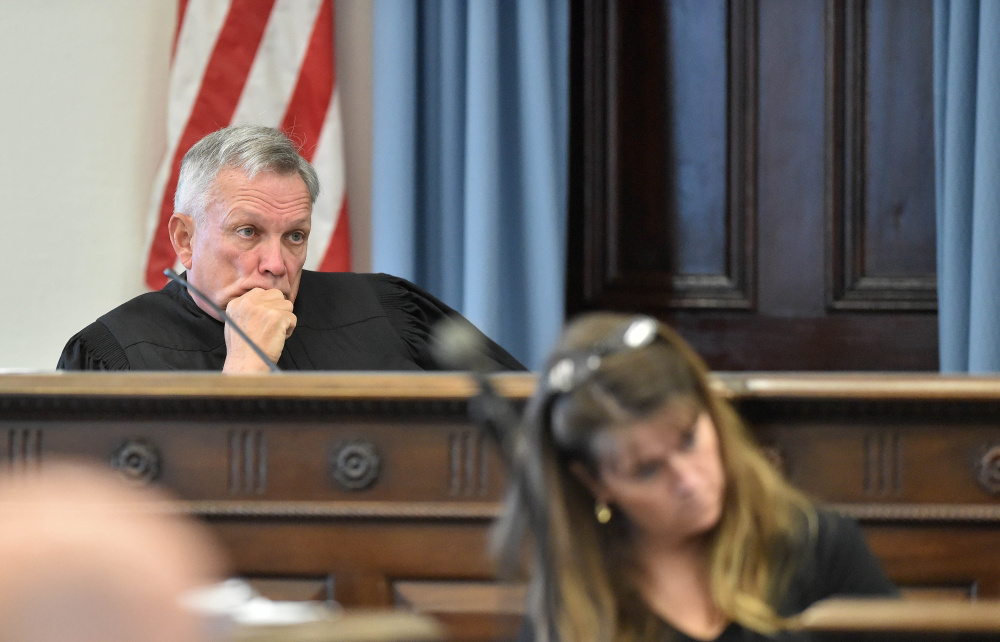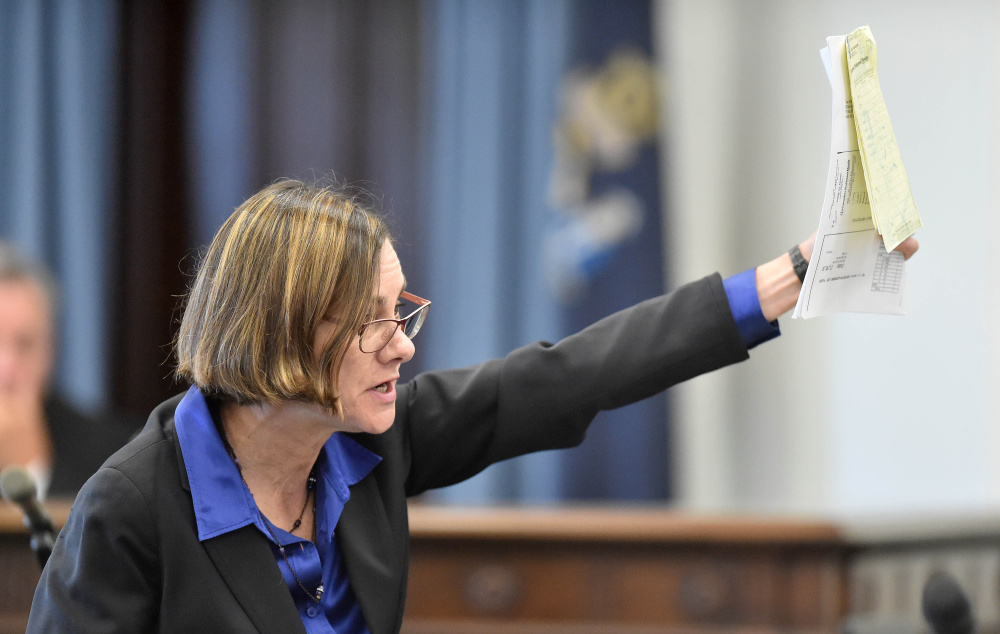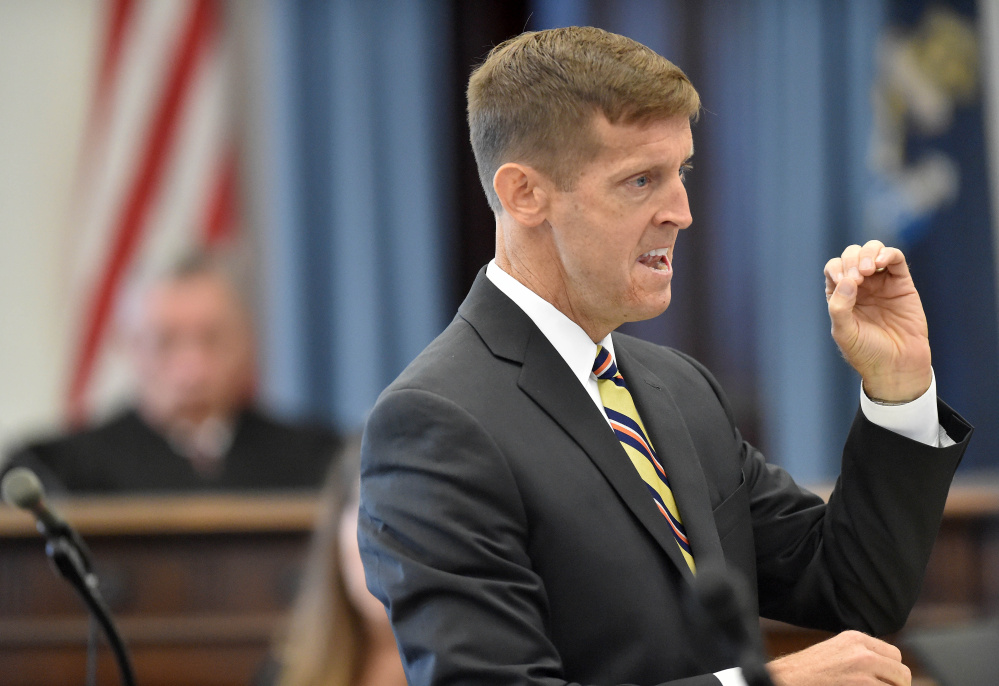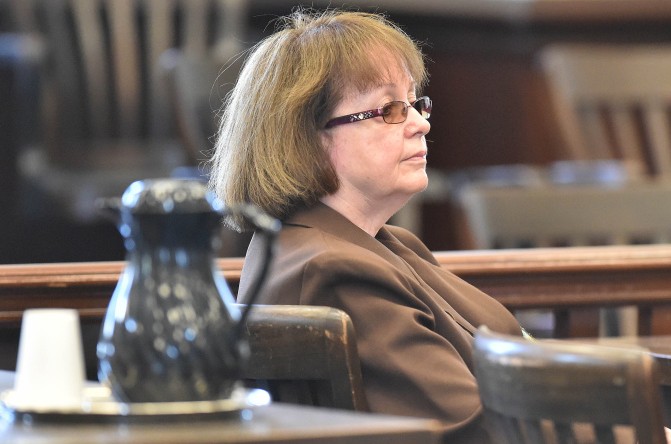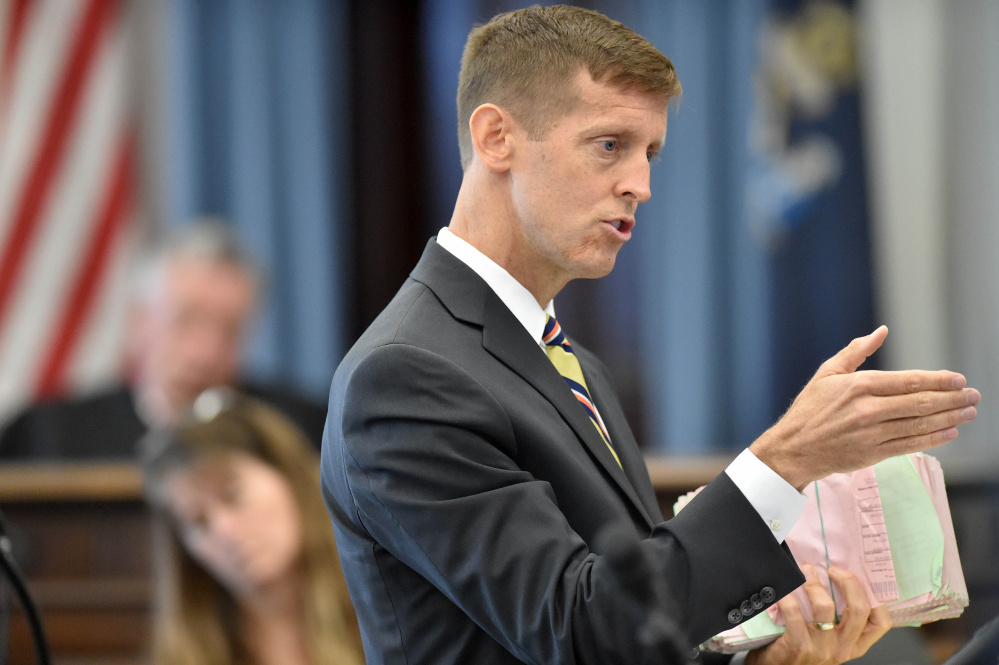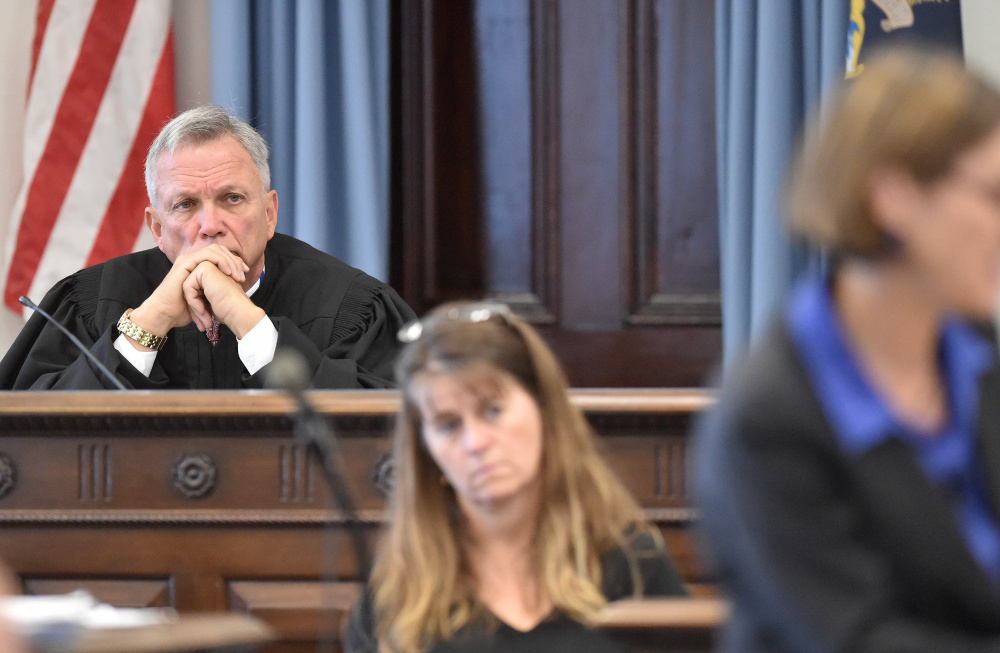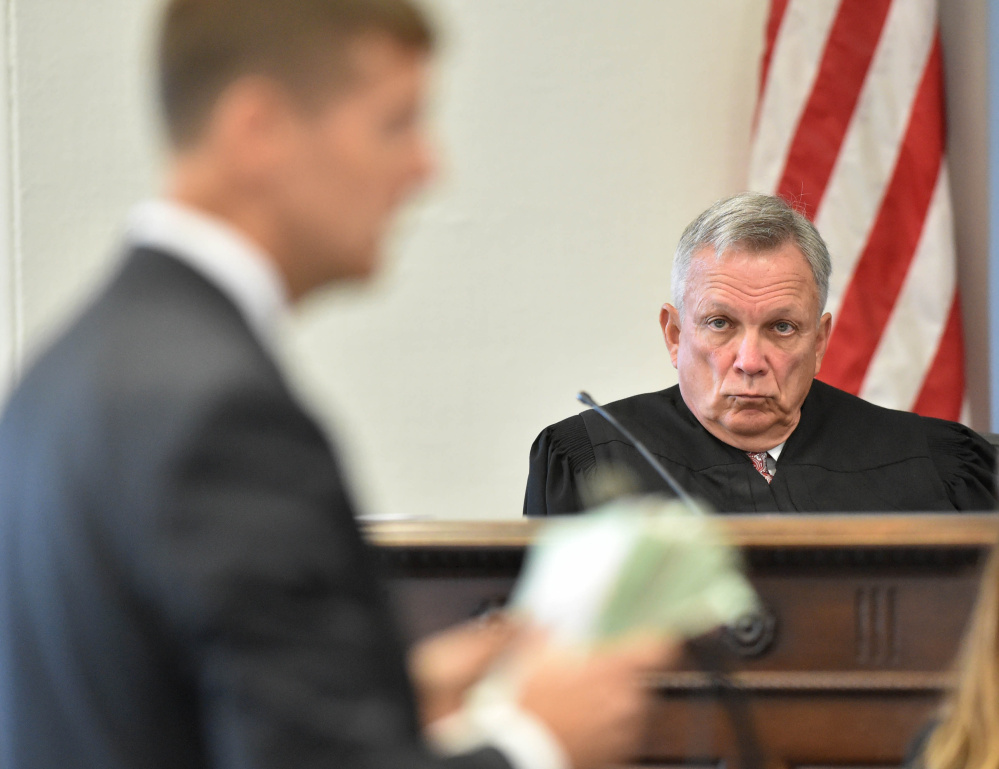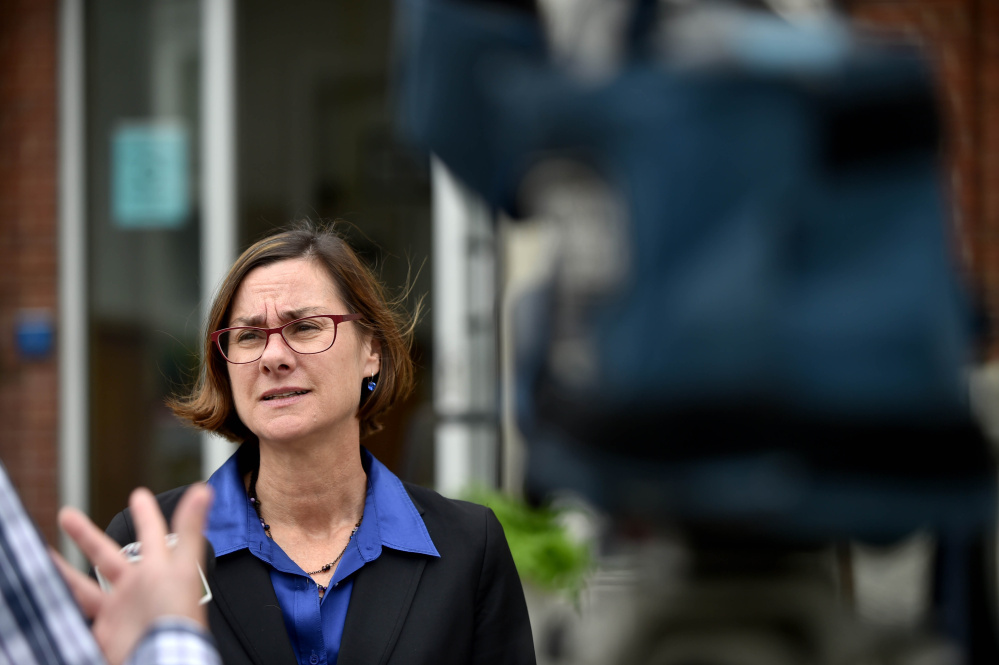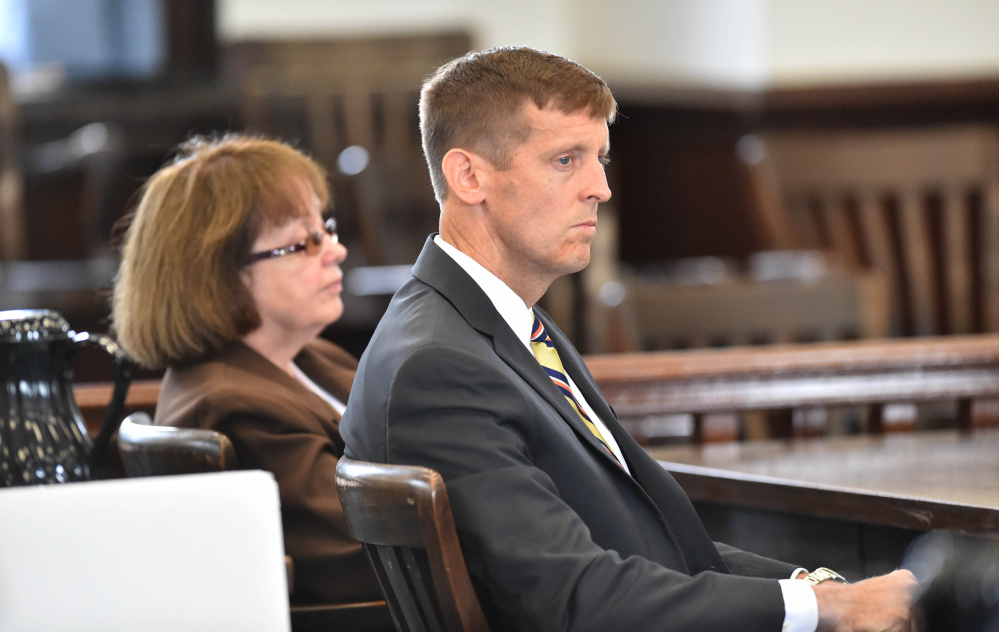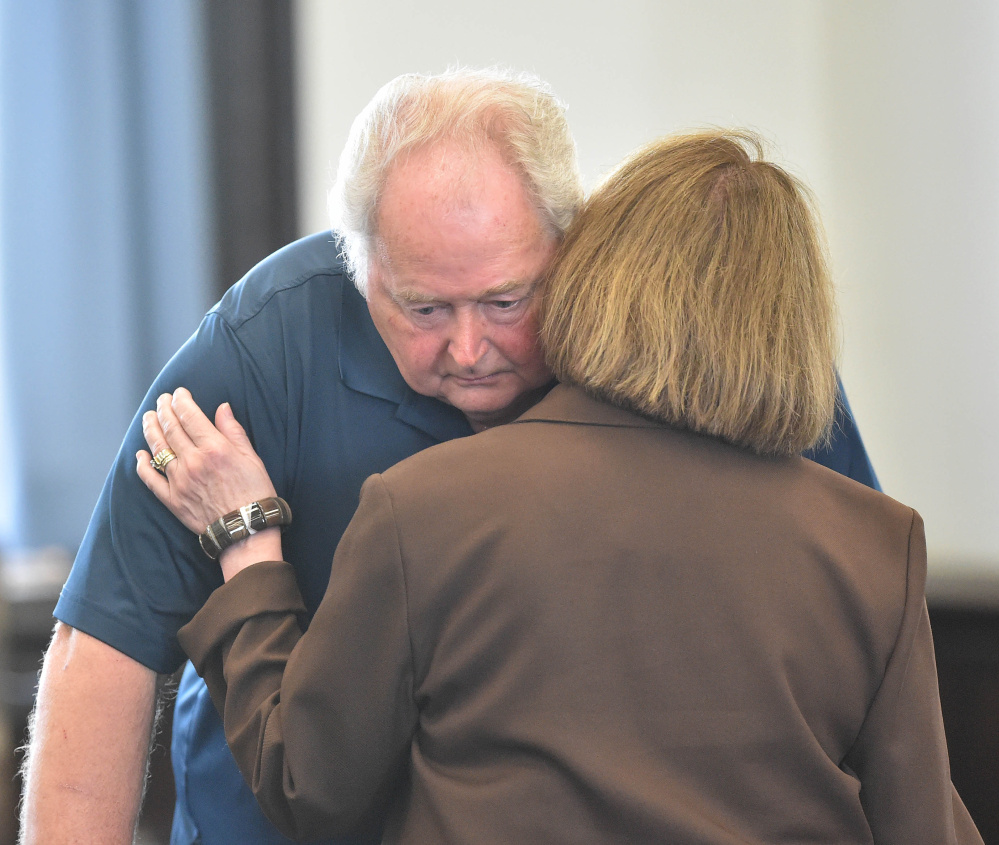SKOWHEGAN — Former Anson Tax Collector Claudia Viles was found guilty Wednesday of stealing more than $500,000 from the town, a historic conviction that the prosecutor says puts the 66-year-old “in a league of her own” among municipal theft cases in Maine.
Assistant Attorney General Leanne Robbin, who prosecuted the case, said she could not confirm whether the amount Viles stole — $500,948 in excise tax money over five years — is the largest town government theft in the state’s history. But “it certainly is a large theft,” Robbin said, and she believes it’s the largest she has ever prosecuted.
The trial before Somerset Superior Court Justice Robert Mullen began Monday and the jury deliberated about two hours Wednesday before returning with guilty verdicts against Viles on one class B felony theft, six counts of failure to pay Maine state income taxes, five counts of failure to make and file income tax returns and tampering with public records.
“Claudia Viles apparently believed she was above the law,” Robbin said in her closing argument Wednesday morning. “She enriched herself by diverting tax paid as excise tax to the town of Anson.”
Viles, who sat near the front of the courtroom with her attorney, Walter McKee, showed no apparent emotion as each of the 13 guilty verdicts was read aloud. McKee, who argued his client was unfairly singled out when others could have been responsible, said after the verdict that he anticipates filing an appeal.
“We thought there was significant reasonable doubt,” he said outside the courthouse, “especially as related to the theft charge and with the absence of any evidence of where that $500,000 went. There’s nothing we can do now, but I do anticipate an appeal.”
Viles was the only person responsible for collecting excise tax — local tax paid on motor vehicle registrations — and she herself reconciled the amount of money collected with bank deposits and filled out treasurer’s receipts, according to employees who testified at trial.
Robbin said after the verdict that Viles is “really in a league of her own with the $500,000 theft, and obviously that will be a factor for the judge to take into account during sentencing.”
A sentencing date has not been set. Class B theft is punishable by up to 10 years in prison and a fine of up to $20,000. The other charges against Viles are class D misdemeanors punishable by up to one year in jail and a $2,000 fine.
Viles has been out on $10,000 unsecured bail since her September arraignment, and those conditions were not changed Wednesday.
After the verdict was read, she left with her husband, Glenn Viles, and declined to comment outside the court. Several relatives, friends and supporters of Viles attended Wednesday’s proceedings and they, too, declined to comment outside the court. Among those who attended the trial was former Anson Selectwoman Inez Moody, who declined to comment. Chairman of the Anson Board of Selectmen Arnold Luce did not respond to a call seeking comment Wednesday afternoon.
The case has divided residents and town officials sharply since it was first revealed at the annual Town Meeting on March 8, 2015, that an auditor’s report had discovered that $77,000 was missing from the town’s accounts. McKee described Viles as a well-loved and trusted tax collector who had been elected each year for 42 years by Anson residents.
Subsequent audit reports commissioned by the town revealed the disappearance of hundreds of thousands of dollars going back several years.
To date, the town has recovered about $250,000 of the more than $500,000 that was missing from the town’s account through an insurance settlement. But Anson Administrative Assistant Tammy Murray, who was in the courtroom, said Wednesday she didn’t know whether the town ever would get more money than that.
She declined to comment when asked whether she believes Viles was stealing from the town in years before 2009, which is, under the statute of limitations, the earliest year for which the state legally could prosecute her for crimes committed.
“We are asking for restitution, so I think that may come out at the sentencing,” Murray said.
In the meantime, she said a special town meeting will be called in Anson to appropriate the $250,000 recovered through the insurance policy now that there is a verdict in the criminal case.
FOX GUARDING HENHOUSE
Robbin had referred to Viles on Monday as “sort of a free-range chicken” — she wasn’t supervised and there was no oversight as to what was happening to the money she was taking in. On Wednesday, she changed the analogy to a fox guarding a henhouse — Viles secretly pocketing cash behind the backs of other residents and town officials.
Over the course of two days the court heard from about a dozen witnesses — all called by the prosecution — including current and former town employees who testified about how Viles was able to steal more than $500,000 over five years.
“As the elected tax collector, Claudia Viles would have been the first person to notice if cash was missing from the excise tax accounts,” Robbin said in closing arguments. “She did, and she said nothing because she was the one pocketing the money.”
She walked the jury through the findings of auditor Richard Emerson, who had documented years of discrepancies in Viles’ bookkeeping. Robbin said Viles manipulated adding machine tapes to produce a total on her receipts that was different from what she had collected, and kept the difference.
The mistakes in the tapes, Robbin said, were not the result of incompetence, but rather the work of someone who was trying to cover up hundreds of thousands of dollars in theft.
When Viles was on vacation, Anson residents could register their vehicles in other towns that would then send the excise tax collected to Viles. Robbin said Viles would deposit the money, but never filed the registrations, essentially using the reimbursements to cover up for money she had taken.
McKee, however, said in his closing argument that Viles didn’t steal the money and deserved an apology.
He pointed to a lack of security at the Town Office, including a 2006 burglary, a lack of surveillance and keys that easily could be reproduced or circulated around town as evidence Viles did not take the cash. “There were a number of people who were in and out of that Town Office on a regular basis who had the opportunity and ability to take that money,” McKee said after the trial. “I’m not going to name names. I’m not going to do that.”
McKee admitted there were mistakes in Viles’ bookkeeping records, but said they were just that — mistakes.
“Clearly there are errors in these documents,” he said referring to the pink and green copies of motor vehicle registrations filled out by Viles and her attached adding machine tapes. “The state calls it theft; other people might call it mistakes were made in a significant number of documents.”
McKee called the “free-range chicken” analogy insulting and challenged Robbin’s notion of a fox guarding a henhouse, pointing to a lack of security at the Town Office and the idea that anyone could have taken the cash, even though the state focused its investigation solely on Viles.
“The problem with the hen house is that (the town) left their so-called henhouse wide open,” McKee said. “Then they pointed the finger at Claudia and said that because she happened to be in the area — along with a lot of other people — she must have been the fox that took the money.”
NO PAPER TRAIL
McKee said that, importantly, the state failed to explain what became of the missing money.
But Robbin said determining where the money went was not required to prove Viles stole it.
“People steal money to spend it,” she said. “And when you spend cash, there often is no paper trail.”
After the verdict, Robbin said that the state had some evidence not presented at trial about where the money might have gone — including a second residence, improvements to the Vileses’ home, a large gun collection and a family to support. Robbin said she did not present that evidence because McKee objected, saying the state had no way of proving when certain items were bought, and the judge agreed.
“Cash can go pretty quickly when you start giving it away to family and friends, and we found that it’s very easy to be generous when you have someone else’s money,” Robbin said. “It looks like that may have happened at least in part in this case.”
In April 2015, state police seized $58,500 in cash from a safe in Viles’ home, money that McKee has maintained belonged to her and had been withdrawn after Viles cashed her largest annual check from the town. The bills were mostly in denominations of $100 and $50 and were neatly packaged as if they had come from the bank, but Robbin questioned how Viles and her husband were paying their day-to-day expenses with almost her entire salary stashed in a safe.
“How can anyone afford to stash almost their entire annual salary earned by both spouses in a safe?” Robbin said. “It has to be other income.”
Separate from the criminal case, the town also has filed a lawsuit against Viles, accusing her of misappropriating $438,712 from 2011 to September 2014. The town has not audited records before 2010 because of the expense and uncertainty over whether the money would be recovered, according to Murray, the Anson administrative assistant.
“Right now the town can’t afford to just keep going back,” she said.
Murray also said she is not concerned about Town Office security lapses that McKee raised during the trial.
“There aren’t cameras, but there are locks and the locks have been changed,” she said. “Any cash is kept in money bags and locked up. There are different measures that we have in place.”
In addition, town practices for collecting and handling excise taxes have changed and one person is no longer left to collect, reconcile and deposit town funds alone, she said.
TWO DAYS OF TESTIMONY
Both the state and the defense rested their cases Tuesday afternoon following two days of testimony in the trial.
In opening statements Monday, Robbin told the jury that Viles had abused her power as elected tax collector to steal about $100,000 from the town each year from 2010 to 2014.
Monday’s witnesses included a parade of current and former town employees and officials who testified that Viles had no oversight, no one kept track of the excise tax money she collected, she resisted learning to use a computer, attempts to make collections and deposits more efficient were ineffective, and once discrepancies were pointed out, related paperwork began to disappear from the Town Office.
Emerson testified that while the numbers Viles provided the town on treasurer’s receipts, bank deposits and adding tapes all matched, the numbers on her adding tapes did not add up to the totals listed.
The result was a discrepancy between the amount of money collected and what was deposited for at least five years, Emerson testified. Emerson said Tuesday that he calculated a difference of $500,948 between what Viles collected and what she handed over to the town between 2010 and the fall of 2014.
Emerson, who has done audits for the town of Anson since 1993, said that the mistakes were never noticed in the past because motor vehicle registrations are not part of the general ledger, a summary of the financial accounts for a municipality or business. An annual audit typically takes two or three people up to four days to complete, while the type of audit that Emerson conducted to review Anson’s motor vehicle registrations took much longer, he said.
Excise tax collections by the town were consistent over the years with the exception of 2014, when there was an increase of about $50,000, Emerson said. Before then, a normal increase each year would be about $10,000 to $15,000, he said.
Emerson testified that he had warned Anson town officials about problems that could arise from the way the town handled excise tax money, but those warnings went unheeded until a new computer system revealed discrepancies. The town implemented a computer system in September 2014 for excise tax collection that included daily deposits, as opposed to the inconsistent deposits some testified Viles had made.
Others testified that Viles and her husband, Glenn Viles, did not file income tax returns for several years before the start of the investigation in early 2015 and that she had unusual personal finance habits, including tendencies to deposit and then immediately withdraw large sums of cash.
Rachel Ohm — 612-2368
Twitter: @rachel_ohm
Send questions/comments to the editors.



